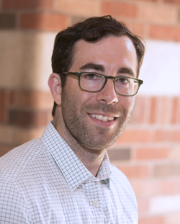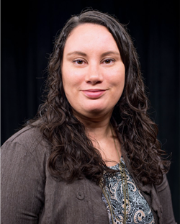Clarissa Chenovick Awarded Prestigious NEH Grant
Monday, Apr 22, 2024
The NEH grant is one of the most prestigious in the study of the humanities, supporting research, education, preservation and public programs in the humanities.
Chenovick’s project segues from her last book “Reading to Weep: Penitence, Embodied Reading, and Spiritual Cure in England, 1350-1650,” which considered the role of the body, cognition and physiological theory in poetry and prose from the 14th through the 17th centuries, focusing on literature that uses medical imagery to describe the effects of sin and repentance.
“The Erotics of Blood Piety” will focus on 16th and 17th century English devotional poetry dedicated to the blood and wounds of Christ. This new project will involve research comparing the medieval period to the early modern period, examining Catholic versus Protestant perspectives, and exploring the forms of eroticism poets from both periods and confessional groups directed towards the suffering body of Christ.
Chenovick views her work as interdisciplinary, particularly in its crossover with history, as seen in her exploration of visual imagery, allegory and poetry in renaissance emblem books. This literary project aligns with the college's interests in the relationships between humanistic and scientific modes of enquiry while crossing over into multilingual discussions, particularly focusing on French and Italian poets.
“Literature from the past should not be viewed as outdated or less profound, but rather as a valuable and enlightening experiment in exploring alternate worldviews,” said Chenovick.
Chenowith’s research has been made possible in part by a major grant from the national Endowment for the Humanities: Democracy demands wisdom.
Chenovick is one of several NEH grant recipients in the College of Arts and Letters. Other recipients are detailed here.
 Michael Rapoport, Ph.D., Department of Languages, Linguistics and Comparative Literature, received an NEH grant for the 2023-24 academic year for a scholarly translation of Fakhr al-Din al-Razi's Compendium of Logic and Philosophy and (al Mulakhkhas fi al-mantiq wa-l-hikma). The project includes the scrutiny of eight separate manuscripts copied by scribes within a century after the original to identify differences and delineate which one might closely resemble the original written by Fakhr al-Din al-Razis himself. The 12th-century book asks some of the same questions we ask today, which scholars have been trying to answer since at least the time of the ancient Greeks. How did life commence, and from where did it originate?
Michael Rapoport, Ph.D., Department of Languages, Linguistics and Comparative Literature, received an NEH grant for the 2023-24 academic year for a scholarly translation of Fakhr al-Din al-Razi's Compendium of Logic and Philosophy and (al Mulakhkhas fi al-mantiq wa-l-hikma). The project includes the scrutiny of eight separate manuscripts copied by scribes within a century after the original to identify differences and delineate which one might closely resemble the original written by Fakhr al-Din al-Razis himself. The 12th-century book asks some of the same questions we ask today, which scholars have been trying to answer since at least the time of the ancient Greeks. How did life commence, and from where did it originate?
 Adrian Finucane, Ph.D., Associate Professor of History, has been awarded three grants by the National Endowment for the Humanities through an award for faculty at Hispanic-serving institutions. The grants are in support of her book project, “Captive Exchanges: Prisoners of War and the Trade in Secrets, 1700-1760” as well as an NEH Summer Stipend for Summer 2021. Finucane’s book addresses themes of warfare and incarceration as well as empire and cultural contact in the 18th century Atlantic world. The work argues that prisoners of war acted as crucial conduits in the development of military and commercial intelligence in the long conflict between the growing British colonies of the southeast and Spanish Florida. In the time before codified systems of international law that addressed what was to happen with prisoners, individual actions by captors and captives had an outsized impact on their own fates as well as empire-building, conflict and cooperation.
Adrian Finucane, Ph.D., Associate Professor of History, has been awarded three grants by the National Endowment for the Humanities through an award for faculty at Hispanic-serving institutions. The grants are in support of her book project, “Captive Exchanges: Prisoners of War and the Trade in Secrets, 1700-1760” as well as an NEH Summer Stipend for Summer 2021. Finucane’s book addresses themes of warfare and incarceration as well as empire and cultural contact in the 18th century Atlantic world. The work argues that prisoners of war acted as crucial conduits in the development of military and commercial intelligence in the long conflict between the growing British colonies of the southeast and Spanish Florida. In the time before codified systems of international law that addressed what was to happen with prisoners, individual actions by captors and captives had an outsized impact on their own fates as well as empire-building, conflict and cooperation.
 Jason Sharples, PhD, Associate Professor of History, received an NEH grant through an award for faculty at Hispanic-serving institutions. The fellowship supports archival research and writing for his book project "Tangled Roots: Florida's Revolving Empires and the Opportunities of Changing Borders, 1760-1830." Sharples will use the fellowship to show that "colonial Florida offers an alternative origin story for the United States." He points to the importance of roots in the Caribbean, Latin America and Native America, as well as the better-studied anglophone North America. He points out that these influences became "tangled" as successive empires -- Spain, Britain, Spain (again), and the US -- claimed the territory.
Jason Sharples, PhD, Associate Professor of History, received an NEH grant through an award for faculty at Hispanic-serving institutions. The fellowship supports archival research and writing for his book project "Tangled Roots: Florida's Revolving Empires and the Opportunities of Changing Borders, 1760-1830." Sharples will use the fellowship to show that "colonial Florida offers an alternative origin story for the United States." He points to the importance of roots in the Caribbean, Latin America and Native America, as well as the better-studied anglophone North America. He points out that these influences became "tangled" as successive empires -- Spain, Britain, Spain (again), and the US -- claimed the territory.


